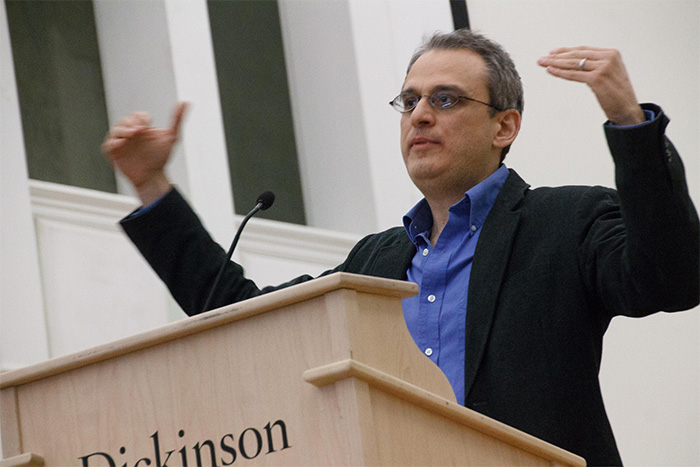Dickinson College
Never Mind the Best and the Brightest

Bill Deresiewicz. Photo by Kathryn Davison '16.
Bill Deresiewicz challenges students to carve a different path
by Michelle Simmons
“You need to get a job, but you also need to get a life.”
“You are more than your ability to contribute to your employer’s bottom line or the nation’s GDP.”
“Leadership requires moral imagination, the possession of a self, so that when the world pushes you, you can push back.”
“We’ve tried aristocracy. We’ve tried meritocracy. It’s time to try democracy.”
With one compelling aphorism after another, Bill Deresiewicz, former Yale University professor and 21st-century contrarian, exhorted the crowd in Allison Hall to rethink the purpose of higher education.
On April 24, the author of the forthcoming book Excellent Sheep: The Miseducation of the American Elite and the Way to a Meaningful Life made Dickinson the first stop on his national lecture tour. The event was sponsored by the Student Senate’s Public Affairs Committee.
In his book, which will be released Aug. 19, Deresiewicz argues that students at Ivy League and other top institutions are losing the ability to think in innovative ways. The book is based on an essay published in The American Scholar in 2008, “The Disadvantages of an Elite Education.”
“I’ve learned a lot over the six years since publishing this essay, in my six years of talking with students and reading their e-mails,” Deresiewicz began. “One of the things I learned most is that there’s a huge hunger out there to discuss the questions that I address, like, why am I here? What is college for? I know it might seem trite, but what’s the meaning of life? Or, how can I begin to think about what the meaning of life might be? Because there’s nothing in the system that makes room for asking and addressing those questions.”
The system that Deresiewicz describes is one that “forces kids to be hoop jumpers, to be excellent sheep, to always be thinking about the next gold star. It leads not so much to careerism, but credentialism. It’s a profound anti-intellectualism, because education becomes completely instrumental. People talk about following your passion and making the world a better place—but only as long as you do it in a way that gets you wealth, status and success.”
Drawing historical parallels, Deresiewicz reminded the audience that the phrase “the best and the brightest,” which is commonly used today to honor high achievers, originated with David Halberstam’s highly critical account of the Kennedy and Johnson administrations’ bungling entry into, and management of, the Vietnam War.
“What we call the meritocracy has … produced a leadership class, especially in the last 10 to 15 years, that has manifestly failed across the board in every institutional area—whether it’s banks, corporations, military, government,” he said. “I think it’s very easy to trace the shortcomings of our adult leaders to the way they’ve been educated. We have a timid, self-serving, out-of-touch, intellectually impoverished class that is leading the country, and indeed the world, off the cliff.”
Institutions like Dickinson may be part of the solution, added Deresiewicz, who sat in on several classes during his campus visit. “When I talk about where to go to college, I mainly say it’s not about where; it’s about how. But I do talk about different institutional models, and one that I end up validating most is the liberal-arts college. This may actually be one of the places that’s doing things really well.”
Learn more:
Published May 5, 2014